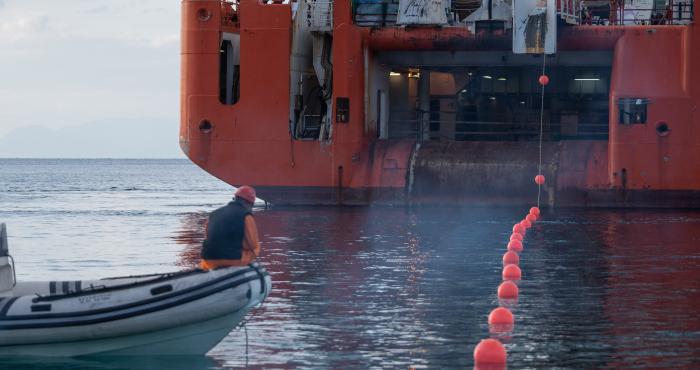The government is “studying” the prospect of making a €25-million payment to Greece’s independent transmission system operator (Admie) to help finance the Great Sea Interconnector project, Finance Minister Makis Keravnos said on Tuesday.
Speaking after the day’s cabinet meeting, he said his own position is that “many aspects of the issue should be ensured”, particularly “the financial viability” of the project and efforts to ensure that should the project be completed, energy prices will fall.
If completed, the project will eventually link the energy grids of Cyprus, Greece and Israel.
Asked about the timeframe needed to come to a decision, he said the matter is “not being examined” by his ministry, as the finance ministry “mainly looks at the financial aspect”, but that there were “also technical issues which other ministries are working on”.
“At the appropriate time, there will be a discussion at government level,” he said.
The Cyprus energy regulatory authority (Cera) has already approved in principle the €25m payment, which should be the first of five annual such payments to Admie, though the government is required to sign off on such a payment before it is made, and Keravnos had said earlier in the month that Cera’s decision “raises concerns”.
“There are questions regarding the criteria it uses, the logic it follows … It seems to me to be a direct argument for a project which is not being implemented, a project which is frozen, a project over which there are serious doubts over whether it will be implemented,” he said.
He then said that while the government has been aiming to avoid levying extra costs onto consumers, this creates “a bit of a pseudo-dilemma”, given that if the Republic of Cyprus does pay the €25m per year until 2029 that Admie had demanded, it will in some way have to be funded by taxpayers.
Cyprus had initially planned to utilise funds made available to it through the European Union’s emissions trading system (ETS) to make the payments, but Admie warned that this arrangement may violate the EU’s rules on state aid, and as such asked Cera to begin charging consumers instead.
“Taxpayers’ money will be paid so that consumers do not have to pay, but all taxpayers are also consumers. I do not know anyone who does not use electricity,” Keravnos said earlier this month.
Then asked what would have to be different for he and his ministry to change stance on the matter and be more forthcoming with the first payment of €25m demanded by Admie, he said his stance would change “if the project were being implemented right now and were at a good stage”.
He added that seabed surveys to determine where cables we laid “have not even been completed”, and that the completion of those surveys is “decisive for the total cost of the project”.
As such, he added, “we are not in a position to know” what the project will cost in total.






Click here to change your cookie preferences